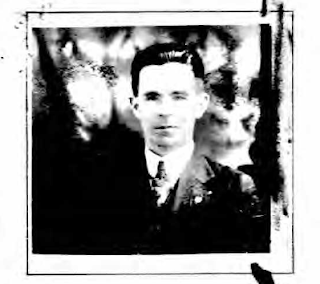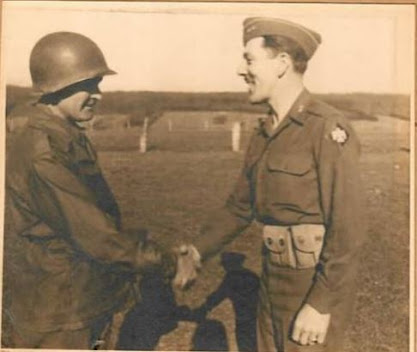Written by guest blogger: Melanie McComb, Senior Genealogist, American Ancestors
Veteran’s Day is traditionally held on November 11th each year. It is a day to recognize the end of World War I, which ended at 11:00 a.m. on November 11, 1918. It is a time when we give thanks to living veterans for their service to our country. Many genealogists like me also like to dig into the stories of our ancestors. I particularly enjoy giving a tribute to those that served in World War I and II. Many of us have been touched by these wars in some way, whether it be a parent, grandparent, or great grandparent that served. I’ll share a few stories below:
WWI – Bernard Corcoran

My great grandfather, Thomas James Corcoran, listed on his passport application that he was accompanying his disabled cousin back to Ireland for a visit. My second cousin three times removed, Bernard Corcoran, came from Dillonstown, County Louth, Ireland. This was the same place where Thomas was from. Bernard’s passport application listed that he was blind and that he was a disabled war veteran. I knew there was a story there.
I completed some newspaper research and was able to confirm how Bernard was injured during WWI. Bernard enlisted in Company F, 165th Infantry. His rank was corporal. On July 28, 1918, he was blinded by a machine gun bullet at Chateau Thierry. Following his injury, he returned home to join his cousin and my great grandfather, Thomas, in Long Island City, Queens, NY.
There was a charity event held in 1919 in Bernard’s honor to raise the funds to help send him back home to his parents in Dillonstown. He never did move back to Ireland but apparently did go back for a few visits. He was reassigned to the Evergreen Hospital for the Blind, where he stayed until he was discharged and moved to Cantonsville, Maryland, in 1932. At Evergreen, he received musical training from the government and even led an orchestra of blinded World War I veterans in 1924. I learned that he married twice, once to Mary Komenda (who died young) and then again to Ethel Murphy, and had two children, Catherine and Margaret (who are both deceased).
WWII – Michael Joseph Doherty

My grandfather, Michael Joseph Doherty, was my hero. He was a young farmer’s son from Prince Edward Island, Canada, who immigrated to the United States looking for a better life. He trained to be a chef. The story goes that he was going to be a chef for a general, but that offer fell through. He served in the 45th Infantry Division, otherwise known as the Thunderbirds. They travelled across Europe, starting in Italy, headed to France, and ultimately ended up in Germany.
During his time in WWII, he was awarded the Silver Star award for his bravery. He was on the front in France when his group was pinned down under enemy fire by the Germans. My grandfather took out a Germany Jerry gun by shooting a rifle grenade at it and took out the gun. He saved his men and was awarded the medal.
In addition to fighting the Axis Powers, he also had to make a horrifying stop at Dachau Concentration Camp. His unit liberated the camp. He came across survivors that resembled human skeletons. He never forgot that experience and didn’t talk much about his experience during the war. I always wondered if he thought back to the days in the camp when he held me as a baby, a child who was half-Jewish.
Bernard Corcoran and Michael Doherty’s military service was more than just dates on a muster roll and other administration records. Both had stories that talk about their bravery and experience processing the hardships of war.
You can learn more about uncovering stories in our upcoming online conversation course, “Uncovering Stories from War and Wartime, 1918-1945: Researching Veteran and Homefront Experiences of the World Wars” on November 2nd at 6:00 PM EST. You can learn more and register for this paid $65 course hosted by American Ancestors at https://www.americanancestors.org/events/uncovering-stories-war-and-wartime-1918-1945-researching-veteran-and-homefront-experiences.